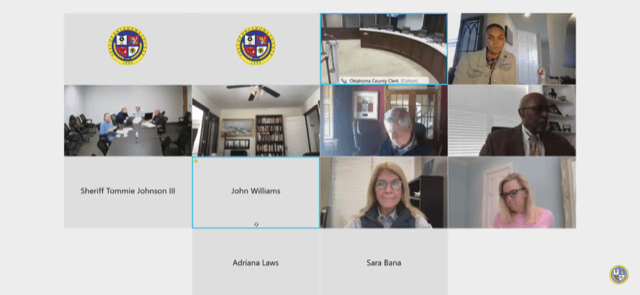
The Oklahoma County Criminal Justice Authority, also known as the jail trust, will begin meeting only once a month after a majority of the trust voted on Friday for a measure calling for a reduced schedule.
The agenda item, put forward by chairwoman Tricia Everest, passed 6-1 with only trustee Francie Ekwerekwu voting against it. Everest said monthly meetings were adequate to conduct business of the trust. Typically, the trust has met several times each month and, at times, weekly.
“We have gone to multiple meetings in a month based on when we did the takeover of the county detention center, and most recently we diverted our schedule again to accommodate the rapid use and identification of how to use the CARES funds,” Everest said. “We feel like our part as a governing board can be accomplished once a month. At this time, it’s not necessary to meet more than once a month.”
Trustee Jim Couch agreed with the move.
“I’ve been associated with the OKC Airport Trust, the OKC Zoological Trust, CASA, and a few others that meet on a monthly basis and do so very efficiently,” Couch said.
Prior to the vote, criminal justice advocate and regular trust meeting attendee Adriana Laws asked the trust to maintain an active meeting schedule.
“I know this is a recurring agenda item—we’ve seen it several times,” Laws said. “I just hope you will consider meeting on the same basis, if not more frequently, at least until we get the number of people and the frequency of deaths at the jail under control. I think there should be some kind of mechanism that requires you to meet after a tragedy at the jail.”
Everest said the trust would continue to call special meetings as issues crop up.
Change to voting requirement fails to pass
Ekwerekwu proposed a motion that would have changed the voting rules to make it possible to pass measures with a majority of those present in a quorum. Theoretically, that would mean that if five trustees were taking part in a vote, three votes would be enough to approve the item. Under the current trust rules, five affirmative votes are needed to move an item forward regardless of the number of members in attendance.
The requirement became a subject of controversy last year, when the trust appeared to vote to remove Immigration and Customs Enforcement agents from the jail by a 4-2 vote in a contentious Sept. 21 meeting.
But, hours later, trust attorney John Michael Williams said the vote was invalid because the rules of the trust require five affirmative votes and in this case there were just four. Chairwoman Tricia Everest, who was appearing by phone, became disconnected from the call prior to casting a vote.
Activist Jess Eddy, who has spoken out on criminal justice issues in the past and who is a regular at meetings, said the change is a good idea.
“I think the legality of that issue (the ICE vote) is still in dispute. However, I think this agenda item will go a long way to prevent such an issue from happening again,” he said. “I think it’s in line with good governance practices that a majority of members present in a meeting shall constitute an affirmative vote.”
Citizen Sara Bana said not all trustees are adequately engaged, making their votes uninformed.
“Part of my concern is if you are not engaged, if you are not involved, you are not present, and you don’t hear from the community you agreed to serve, you just randomly show up and decide to vote one way or another erratically,” she said. “I think if there is quorum for your meeting to take place, a majority of votes that were present at that meeting, they are counted.”
There are currently nine members of the trust. Everest said there was no need to change the trust rules.
“I am strongly against the changing of our indenture to give three people the power over the nine to make any type of votes and I think it’s very important that we keep the majority at five,” Everest said. “I fundamentally don’t understand why you want to change it where three people can vote for the nine.”
Ekwerekwu said the lack of attendance of some members to meetings is one reason she brought the measure forward.
“The people at the meetings have invested their time and their effort to be there and would like for their vote to be honored no matter how it comes out,” she said. “I think it’s only fair we honor the trustees who do show up and who do care about the issues that we’re voting on.”
The item was voted down by a 5-2 margin with only trustee Sue Ann Arnall joining with Ekwerekwu in favor.





















